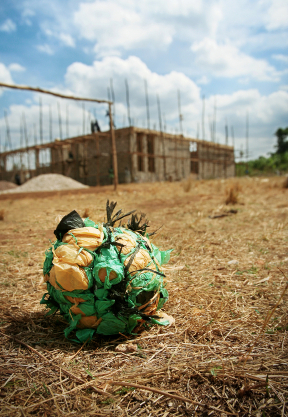The 3 Cs of Plastic Bag Bans Around the World: Culture, Convenience & Cost
POSTED ON January 22nd, 2013 BY Nancy Roberts
This month, Alameda County joins dozens of California cities and counties to ban plastic bags in most retail establishments. As part of outreach to prepare the public, events like reusable bag giveaways were conducted, right. Plastic bag bans have picked up steam around the world. Entire countries, from Rwanda to Ireland, have implemented bans to reduce the environmental scourge of those oh-so-convenient plastic bags.
Outreach (beyond enforcement of penalties) needs to play a key role in bag ban success. Is there an optimal scope for the ban, the best time frame for phasing in, the most effective messaging to gain acceptance? It looks as if bag bans, like so many other measures aimed at changing behavior, are affected by the 3 Cs: Culture, Convenience and Cost, as well as the big T: Time. As is so often the case, it takes way longer than might be expected for a simple behavior change to take root and become second nature … but it can be done.
Lessons from the Developing World?
Interestingly, the “developed world” was not a leader in banning plastic bags. The first country to ban plastic bags was Bangladesh, back in 2002. The impetus for the ban was the dangers of increased flooding and sewage problems as plastic bags clogged the sewer infrastructure. Outreach seems to have consisted of threats:
“After the ban, the government, environmental groups and NGOs carried out awareness programmes on TV and in mass information campaigns, warning offenders that they could be fined up to the equivalent of US$71 and six months of imprisonment for using polythene bags.”
The ban encountered problems due to lax enforcement and a lack of affordable alternatives to plastic for all uses, though jute bags were encouraged. Ten years later, plastic bags are still surreptitiously handed out by some vendors, but plastic is much less of a problem today for the country’s drainage system, a huge issue for the low-lying nation.
Culture’s Role
Enacting policy takes time: a nationwide ban on plastic bags in Rwanda was proposed in 2005, and passed in 2008 (some plastic bags have been made into soccer balls, right). The ban has been quite effective, as an accepted cultural event was incorporated from the beginning: gathering up plastic bags was incorporated into the nation’s monthly mandatory community clean-ups. Plastic-Free Times reports, “Once the ban passed, locals were encouraged to use the monthly obligatory communal work session, known locally as umuganda to collect all the plastic bags lying around or buried.”
The Burden of Cost
Haiti, the poorest nation in the Western Hemisphere and still recovering from the massive earthquake of three years ago this month, banned both plastic bags and foam containers last fall. As of October 1, the import, manufacture or marketing of the bags and containers is forbidden. Besides fighting the pollution issues, it is hoped that the ban will spur the local economy to create alternatives: “Importing, manufacturing bio-degradable items will benefit Haiti’s short, mid- and long-term environmental interest,” noted Prime Minister Laurent Lamothe. Just as here in California, the ban will disproportionately affect the poorest sectors the hardest, as affordable alternatives to the lightweight and ubiquitous plastic bags are not yet widely available. Regressive effects are a factor in the U.S. as well: in an attempt to correct for this, the Alameda County ordinance on plastic bags exempts those paying with WIC (food stamps) from the ten cent charge for reusable bags.
Making the New Behavior Convenient
Far from the streets of Oakland, the citizens of Delhi, India are struggling with massive environmental challenges, including plastic bag pollution. The city government banned bags in 2009, but the ban did not take, particularly at smaller retail stores, and manufacture and use continued. Last November, a new ban on the manufacture, import, sale, storage and use of all plastic bags, sheets, films or tubs (except for those for biomedical waste) went into effect, with enforcement and penalties to be doled out under the Environmental Protection Act. The New York Times reports that outreach efforts are being incorporated from the beginning: “Government officials are also planning to start an awareness campaign about the separation and recycling of waste, using social networking sites, and will hand out a limited number of jute and cloth shopping bags to select Resident Welfare Associations.”
Different cultures around the world have to approach the issue of pollution differently, taking into account local customs, government structure, and available alternatives. Some days it seems like achieving Zero Waste is a losing battle, but each step toward raising awareness of pollution and its consequences is an advance that will pay off in planetary spades.
For more on bag bans around the world, see Drop the Plastic Bag.

